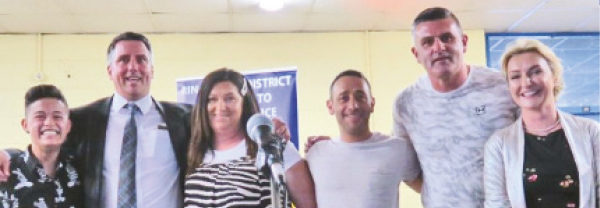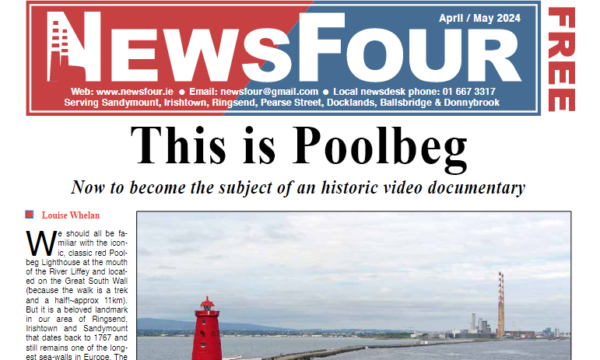By Beibhinn Byrne
The teenage years are notorious for trouble. A highly-charged and creative time in life that can prove tricky for most often requires huge support.
The many rites of passage at play – from peer group approval to sexual awakening, growing independence and freedom, to anxiety about identity, insecurity, a wavering spectrum of self-worth and the hostile arrangement of hormones – all are confluent tributaries that can become an overwhelming swell.
Home isn’t always the help or comfort it should be either. Often times, it can be the original source of discomfort that drives many teenagers to self-harming addiction. Even when this isn’t the case, the most nurturing parents can be at a loss or feel helpless faced with the heartache of a family member experiencing such suffering.
There are many reasons why any young person may end up harming with substance abuse, but there is only one, true, long-term solution and that is to undergo treatment and support and recover. The Ringsend and District Response to Drugs (RDRD), located at The Spellman Centre in Irishtown, does vital work in the community to help and support young people and their families.
The centre was established in 1995 by its current manager Teresa Weafer and the late Fr. Paul Spellman. Teresa was a community youth worker at the time who saw first-hand the harm addiction was doing to young people and their families. Fr. Paul was a parish priest and with the indispensable assistance of Betty Bissett they set up the RDRD
The Ringsend & District Response to Drugs (RDRD) comprises of statutory, voluntary and community groups which have come together under the umbrella of the centre.
The project’s goal was, and remains: ‘To support young people and their families in their struggle to become free of drugs’. Located in the Spellman Centre on Irishtown Road, RDRD provides a wide range of services with the aim of combating the effects of addiction and drug use and to support people on their journey toward rehabilitation.
RDRD works closely with the community to create awareness of drug misuse issues and help the community respond to the problem. Community is key, and it was out in full force at the annual RDRD drug awareness graduation event.
It was a golden moment of achievement on a hot, and sunny June evening. Ringsend College’s auditorium was coppered with late evening sunlight. Each individual table was decorated with goldfish swimming in bowls surrounded by lit candles that reflected the shimmer.
Recovered graduates, their families, friends and supporters animatedly seated themselves at tables or milled about greeting one another triumphantly, drinking non-alcoholic refreshments and checking out the barbeque area outside the doors at the far side of the room. The room was packed.
A display of children’s pictures and slogans artistically expressing positivity and the clear bell of children’s emotional wisdom and insight was a joyful testament to proactive classes in self-esteem and reinforcement at these developmental stages. A cohort of pre-teen youngsters were awarded certificates for their work.
Adult artwork was also on display. The hot weather brought the summer clobber of short shorts and skimpy T-shirts and a roomful of arms and legs showed off some very fine tattoo work to full advantage. And the eye travelled. The intricate realism of a coloured dream catcher that you felt you could catch the rope of was one marvel, another shoulder displayed minutely detailed, winged mythical creatures, while elsewhere, intricate, thunderous old gods and a menagerie of animals were glowering on calves, shin bones, backs, shoulder blades and arms, and were long wrought achievements in their own right.
It was a celebration and everyone here was ready to congratulate and acknowledge the hard and brave work from these inspirational young people and the depth of the emotional achievement won by them. Whoops and cheers went up every time someone got roll called followed by long applause when each assembled group stood awarded.

Nearly all of the local politicians, both councillors and ministers, attended, there was a very supportive presence from the new Garda Supt. of Donnybrook and Irishtown Tim Burke with many of his colleagues, including the well-known and friendly community Gardaí Derek Dempsey and Anthony Kelly.
Many local community activists were there, not only from Ringsend, but from across the city, including ‘from across the bridge,’ represented by St Andrew’s Resource Centre’s Betty Ashe. Another long-time Drugs Task Force member Dermot Lacey was also present and has only just recently stepped down from these duties and of course co-founder of RDRD at The Spellman Centre, prime mover, Teresa Weafer as well as Dublin Port representatives and many volunteers and co-ordinators.
During the welcoming speech, it was highlighted that recent cuts in budgets and current government policy have made things very difficult for drug services resources all over the city. They are not getting the financial support they need and it is through the sheer dedication of the volunteers, workers and community that they are getting by. It was stressed that without Dublin Port’s sponsorship, many programmes would simply not go ahead.
This conscientious, social engagement reflects well on Dublin Port, but reflects poorly on the current government’s successive social neglect. That it is leaving it up to the generosity of big business to help out vital social services, rather than formulating strong policy and earmarking properly costed budgets for funding such important and necessary schemes is really an indictment of its priorities.
How much of this dissonance was felt by the legion of politicians present, enjoying the community camaraderie and ingratiating themselves with potential locals’ votes is questionable, as none of them voiced an opinion, risked a response or tackled the issue when speechifying later.
When the correct services and supports are in place, it works. In recent years the process found most effective, and now being followed, is the Iceland model, so named because in 1998, 42% of Iceland’s 15 and 16 year-olds reported that they had got drunk in the past 30 days. By 2016, though, this figure had fallen to just 5% and drug use and smoking had also sharply declined.
The action plan that led to this dramatic success – strikingly – does not focus on tighter policing or awareness campaigns to warn children off bad habits. Instead, top researchers collaborate closely with communities on initiatives like parental pledges and night-time patrols after dark, while the government invests in recreational facilities.
Its basic principle stems from working with parents and the community ‘to have their backs’ rather than ‘be on their backs’. The Spellman centre has also added over the last seven years a range of holistic services to its programme, including acupuncture, mindfulness training and reiki.
If you, a friend or a family member have a drug or addiction problem and are looking to access support and services which can help, The Spellman Centre, which provides positive and non-judgemental support towards rehabilitation, welcomes you to contact them.
Telephone : 01 667 7666 https://rdrdspellman.wixsite.com/rdrd/



